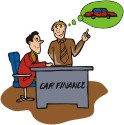| Gary Foreman is a former Certified Financial Planner (CFP) who currently writes
about family finances and edits
The Dollar Stretcher website
http://www.stretcher.com. You'll find hundreds of FREE
articles to stretch your day and your budget! |

Is
it better financially to buy or lease an automobile since it's a
depreciating asset? Thank you kindly.
--Mark
Like most people, Mark is probably
attracted to the lower monthly payments of an auto lease. But, even
with the lower payments it's usually better to buy. There are a
couple of reasons that's true. You don't build up equity in a leased
auto. You'll also be prone to trade cars more often and you give up
flexibility if you need to get rid of the car quickly.
Mark's question points to the main
reason why leasing isn't the best deal. A car is a depreciating
asset. And a car depreciates more quickly when it's newer. A $15,000
car will lose approximately 25% of it's value in the first year.
From year two through year six the car will lose between 6 and 9%
each year with the bigger losses in the earlier years.
Once you lease an auto you're much
more likely to drive a new car every few years. And the first miles
are the most expensive that you can put on a car. Your cost of
ownership drops dramatically if you keep a car 6 or 7 years.
For instance, if you drive 12,000
miles per year, the depreciation alone during the first year on a
$15,000 car will cost you 31 cents per mile. By the time you get to
the sixth year those miles only cost 7 cents each. Clearly those
first couple of years are very expensive ones.
 Let's take a look at a fairly typical
dealer ad. It offers a popular new model for $13,998 with 1.9%
financing or a four year lease with $1,000 down and monthly payments
of $249. Let's take a look at a fairly typical
dealer ad. It offers a popular new model for $13,998 with 1.9%
financing or a four year lease with $1,000 down and monthly payments
of $249.
If Mark takes the lease deal he'll
pay a total of $12,952 over the 48 month period including his $1,000
down payment. So he's pretty much paid for the entire car. But, when
the lease ends he won't own the car. He'll be required to turn it
in. And, if he's put on more mileage than the lease allows or the
car shows any unusual signs of wear, Mark will face extra charges.
Suppose he chooses to buy the car
instead. He'll spend $13,508 over a 48 month period. That assumes a
$1,000 down payment and the 1.9% financing. His monthly payment
would be $281. Not much more than the lease.
Let's further suppose that Mark's
credit isn't good enough to qualify for the 1.9% financing. We'll
assume that he pays today's average rate of 8.4%. That would bump
his monthly payment to $319. That's $70 more each month than the
lease, but he'll be building equity in the car.
The big advantage to buying comes at
the end of the 4 years. He'll own the car outright. It will be worth
approximately half of it's original $13,998 purchase price. So he'll
end up with an asset of about $7,000 that he can continue to drive.
If he had leased there would be few
choices. He could buy his old car from the leasing company. That
would mean adding a couple more years of payments. He could be
paying 6 or 7 years on the same $14,000 car! Or he could turn the
car in and go find something else. Probably another lease. And he'd
join the ranks of those who will always be driving new, but
expensive cars.
Maybe Mark is concerned with the
reliability of a four year old car. Most cars can give more than
four years of dependable service. But let's buy an extended warranty that would cover the car until it's six years old for an
additional $850. So instead of signing a new lease at $250 per
month, he's spending about $35 a month for the extended warranty.
In the fifth and six year he'll have saved $5,100 on lease fees plus
he'll have his old car to use as a down payment for a newer car.
 Besides the ownership issue, a lease
could set Mark up for a nasty surprise. Sure, he expects to drive
the car for four years. But everything doesn't always go according
to plan. A lost job or sick child could make that car payment too
big to handle. If he should need to get out of the deal early, it's
harder to terminate a lease. Most carry a hefty penalty if you want
to turn the car in early. Besides the ownership issue, a lease
could set Mark up for a nasty surprise. Sure, he expects to drive
the car for four years. But everything doesn't always go according
to plan. A lost job or sick child could make that car payment too
big to handle. If he should need to get out of the deal early, it's
harder to terminate a lease. Most carry a hefty penalty if you want
to turn the car in early.
Some leases can be sold, but Mark
would still be hurt financially. Selling any car in the first year
or two is costly. Owning the car does give him more chances to get a
better price.
OK, one final argument. What happens
if Mark can only afford the $249 per month. Maybe $319 is too much
for his budget. The correct answer for Mark still isn't to lease.
It's to find a car that he can buy that fits within his budget. It
might be smaller. Maybe used. But at the end of four years he'll own
a car instead of walking away from the dealership empty handed.
--End--
| 